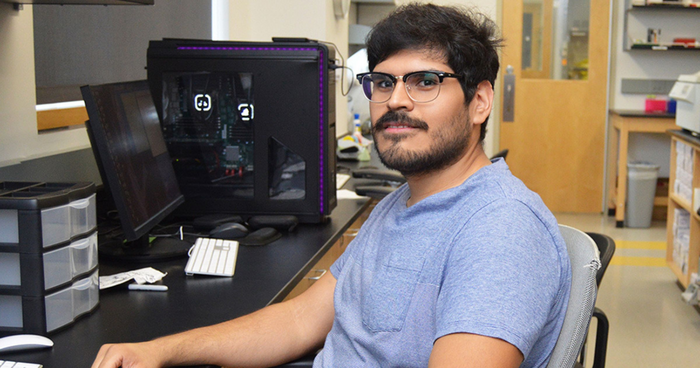A team led by biologists at The University of Texas at Arlington has published a study supporting the theory that species that reproduce asexually have more harmful genetic mutations than those utilizing sexual reproduction.

Credit: Randy Gentry/The University of Texas at Arlington
A team led by biologists at The University of Texas at Arlington has published a study supporting the theory that species that reproduce asexually have more harmful genetic mutations than those utilizing sexual reproduction.
Jose Maldonado, a UTA doctoral student in biology, is lead author of the new paper, titled “Parthenogenesis doubles the rate of amino acid substitution in whiptail mitochondria.” It was published in May in Evolution, the flagship journal of evolutionary biology.
Co-authors include T.J. Firneno, a postdoctoral research associate at the University of Denver who received his Ph.D. from UTA in 2020; Alexander Hall, a product application specialist at Thermo Fisher Scientific who received a Ph.D. from UTA in 2016; and Matt Fujita, UTA associate professor of biology, who is Maldonado’s faculty advisor and previously served in the same role for Firneno and Hall.
Parthenogenesis is a natural form of asexual reproduction in which growth and development of embryos occur without fertilization by sperm. It is generally believed that sexual reproduction leads to fewer harmful genetic mutations than asexual reproduction.
In their new study, Maldonado and his co-authors tested this theory by studying Aspidoscelis, a genus of whiptail lizards. Due to their high abundance and distribution throughout the southwestern United States and northern Mexico, these reptiles are an excellent model system to study the fundamental cellular mechanisms of parthenogenesis and the genomic consequences of asexuality.
The team used whole mitochondrial genome data from asexual and sexual whiptail lizards to investigate their prediction that parthenogenetic lineages accumulate mutations faster than sexual lineages.
“Our study demonstrates that when whiptail lizards transition from reproducing sexually to asexually, it is followed by the accumulation of harmful mutations in the mitochondrial genome,” Maldonado said. “If asexuals accumulate more harmful mutations than their sexual counterparts, as our findings show, this could explain why asexual reproduction is rare in nature and why sex is the dominant form of reproduction in the natural world.”
The team sampled multiple populations of both asexual and sexual whiptail species throughout the southwestern United States and received additional tissue samples from collections at the Burke Museum of Natural History and Culture in Seattle and the American Museum of Natural History in New York City.
Their research showed that the transition to asexuality led to relaxed natural selection in parthenogenetic lizards and the build-up of nonsynonymous mutations, which change the protein sequences of a gene and are frequently subjected to natural selection. This supports previous theoretical predictions that “the loss of sex should lead to an irreversible build-up of deleterious mutations due to a reduction in the efficiency of purifying selection, and sex facilitates the removal of harmful mutations,” they wrote.
“The main finding of our study is that asexual vertebrates, or at least these lizards, accumulate amino acid substitutions, which could be potentially bad for the organism, at a much higher rate than sexual species,” Firneno said. “This is important because there is a paradox that it is much more costly to reproduce sexually, but that it is the pervading form of reproduction.”
Journal
Evolution
Article Title
Parthenogenesis doubles the rate of amino acid substitution in whiptail mitochondria




